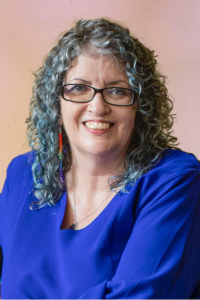One-ness and Change: Reflections on Pride
Published June 11, 2024
Inside OME

By Linda Grace Solis, PhD, associate professor of applied humanities, Master of Biomedical Science program director, University of the Incarnate Word School of Osteopathic Medicine
“We are all one – and if we don’t know it, we will learn it the hard way”. - Bayard Rustin
This quote is from Bayard Rustin, the architect of the 1963 March on Washington for Jobs and Freedom. Rustin has been largely left out of the historical narrative surrounding the Civil Rights Movement. That he was a member of the Communist Party in the 1930s was mentioned as a cause of this slight. That he was imprisoned during WWII as a conscientious objector was also listed as a reason. The true reason, however, seems to be the fact that Rustin was gay. It could be literal murder to be gay in the USA in the 1930s, ‘40s and ‘50s so Rustin didn’t flaunt his sexuality, although his contemporaries say it was an “open secret”. That he, a person who was marginalized even by those who were fighting for civil rights, was able to see the one-ness of humanity offers us an example of the very one-ness of which he spoke.
DOs and osteopathic medical students are uniquely positioned to embrace the sentiment at the center of Rustin’s statement: “We are all one”. The osteopathic approach focuses on the interrelatedness of mind, body and spirit. This interrelatedness can and should be extended to the whole of humankind! In doing so, we acknowledge that every person should enjoy the same rights, regardless of who we are as human beings, who we love, how we love, what we wear, what we believe.
Rustin’s quote is a balm in the face of the blatant hatred and bigotry launched at the LGBTQ+ community. It is easy to become overwhelmed, to want to give up…but there’s another way. We can use our frustration, even our anger, as a catalyst for keeping up the good fight, for continuing to work for the nation we deserve, a nation that is safe for all, regardless of sexuality, gender expression, gender, race, ethnicity, country of birth or any other human difference. A nation whose people are truly equal, regardless of their differences, is a nation that embraces its people because of their differences.
Sometimes, though, change feels impossible. The temptation to give up, give in to the bullies and the haters is strong. Sometimes giving up–shutting up–feels like the only way to keep our loved ones and ourselves safe. As I consider this,
I remember this quote from the Pirkei Avot: “You are not obligated to complete the work, but neither are you free to abandon it” (2:21). Somehow, remembering that I am not obligated to solve the problem makes me far less likely
to abandon the work. I also remember that I am not in this work alone, that there are vast numbers of people near and far who are also invested in this work. Sometimes, for our own safety, the safety of our loved ones, our own mental and physical
health, we have to step away, and stepping away is ok, good even!
Working together, stepping away when we need to and knowing that others will carry on, leads to change. As I reflect on Pride and the changes that must happen to reach true equity, I can’t help but think about the historic decision of the United Methodist Church to repeal its longstanding ban on LGBTQ+ clergy and its rejection of same-sex weddings (marriages are now between “two people of faith” rather than “between a man and a woman”). I’m what they call a “cradle to grave” United Methodist. I was baptized into the church as an infant and have been a member my whole life. I have been outspoken in my desire to see the harmful language about the LGBTQ+ community removed from our rule book (The Book of Discipline). And finally, in the year of our Lord 2024, it happened. Church delegates voted definitively, and the harmful language was removed.
This sea change, one that has been decades in the making, shows me that institutions and systems which once seemed intractable, can be changed by the individuals within them. Let’s keep working together and taking care of one another while we continue our work.
I love you just as you are. I am your safe space. I celebrate you. You bring me joy! I am here for you and with you.
Happy Pride, y’all!
Sources:
- "Bayard Rustin—Out of the Shadows" from The American Prospect
- "Top Quotes From Bayard Rustin, The First Openly Gay Black Civil Rights Leader" from Black America Web
- "United Methodists repeal longstanding ban on LGBTQ clergy" from AP News
